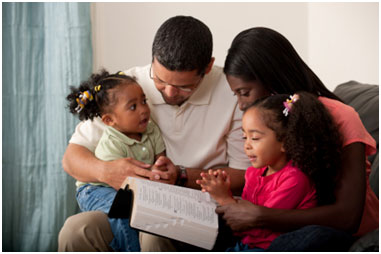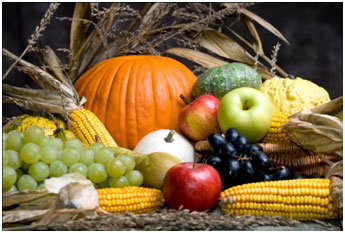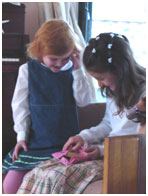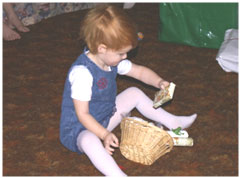|
While WLC continues to uphold the observance of the Seventh-Day Sabbath, which is at the heart of Yahuwah's moral law, the Ten Commandments, we no longer believe that the annual feast days are binding upon believers today. Still, though, we humbly encourage all to set time aside to commemorate the yearly feasts with solemnity and joy, and to learn from Yahuwah’s instructions concerning their observance under the Old Covenant. Doing so will surely be a blessing to you and your home, as you study the wonderful types and shadows that point to the exaltation of Messiah Yahushua as the King of Kings, the Lord of Lords, the conquering lion of the tribe of Judah, and the Lamb of Yahuwah that takes away the sins of the world. |
The loving Creator who designed the family unit also built a support system in which to nurture and protect that family: the yearly schedule of religious feasts (commonly referred to as "Jewish Holidays"). Three times each year the men of Israel were required to travel to Jerusalem and together worship their Maker and renew their personal covenant commitment. At these events, the men were instructed in their duties as priest of the home and protector of the national covenant relationship of Israel with Yahuwah. The men were the first defense against any apostasy and rebellion that would bring disaster on the nation. Just as the posts held up the court curtains surrounding the Sanctuary, so the elders and fathers of the nation were to hold up the standards of morality in their families. All Israelite men were to learn and obey statute law, and then each was to teach it to his wife and children. The entire nation was thus to have the same standards and religious beliefs.
Yahuwah ever has a tender heart for mothers and their struggles. He knew that such travel three times in seven months would be difficult for a pregnant woman or a mother with young children, so the women were not required to go, although all who could were encouraged to do so.
 While the yearly feasts were to be a blessing to all, they were intended in a special way to bless the family. There are certain elements that must always be present to have a strong, healthy family: parents who love and worship the Creator; a mother with a tender, compassionate heart who diligently trains her children to love, honor and obey Yahuwah; and a father who will be priest of his household, instructing his family by words and example to love Yahuwah with all one’s mind, soul and might, and his neighbor as himself. The feasts set aside specific times of the year that were to be devoted both to worship and to strengthening family ties. By assembling together, national identity and loyalty were greatly strengthened. The bonding with extended family made tribal ties strong and lasting.
While the yearly feasts were to be a blessing to all, they were intended in a special way to bless the family. There are certain elements that must always be present to have a strong, healthy family: parents who love and worship the Creator; a mother with a tender, compassionate heart who diligently trains her children to love, honor and obey Yahuwah; and a father who will be priest of his household, instructing his family by words and example to love Yahuwah with all one’s mind, soul and might, and his neighbor as himself. The feasts set aside specific times of the year that were to be devoted both to worship and to strengthening family ties. By assembling together, national identity and loyalty were greatly strengthened. The bonding with extended family made tribal ties strong and lasting.
Because the father and husband was to be the priest of his own household, the yearly feasts provided a chance for the priests at the temple to feed the minds of the priests of each individual home. Each year during the Feast of Tabernacles, the Law of Moses was read aloud to the people. The requirements of the statutes and judgments were to be memorized and practiced in order to guard against individual sin and apostasy. The men were thus taught how to rule their own households with justice, mercy, compassion and love, and they in turn could, by example, teach their families the beauty of holiness.
The fall feasts in a special sense were a time to review the past year, both in repentance and in thankfulness for blessings received. Three feasts were specifically designated for the fall: Feast of Trumpets, Day of Atonement and Feast of Tabernacles. Each one had a special purpose to draw the hearts of the people back to their Creator and, in so doing, closer to each other.
Feast of Trumpets
"And . . . [Yahuwah] spake unto Moses, saying, Speak unto the children of Israel, saying, In the seventh month, in the first day of the month, shall ye have a sabbath, a memorial of blowing of trumpets, an holy convocation. Ye shall do no servile work therein . . . ." Leviticus 23:23-25
Feast of Trumpets is unique of all the feasts. It is the only yearly sabbath that occurs on a New Moon. While New Moon’s are always in a class of worship day by themselves, Feast of Trumpets is explicitly called a "sabbath," or, a rest.1  No common work is to be performed on Feast of Trumpets, but it is a day of soul searching, seeking if there is any area of the heart, mind and life that is not in agreement with the standard of the holy law. Day of Atonement comes in the same month with its required solemnity / affliction of soul, beginning on the 9th at even and observed until even of the 10th. The days from Feast of Trumpets to Day of Atonement are days of continued soul-searching, preparing for the huge blessing awaiting those who by faith experience cleansing from sin on the Day of Atonement. All the Israelite nation was to unite; all believers today are to unite in repentance, confession and the restoration of every wrong. Thus, these feasts should not be thought of as simply "Jewish Holidays" - They are YAHUWAH'S FEASTS - ordained for every believer who, by faith, will embrace the perpetual covenant of His Grace which was solidified and made sure by the blood of Yahushua.
No common work is to be performed on Feast of Trumpets, but it is a day of soul searching, seeking if there is any area of the heart, mind and life that is not in agreement with the standard of the holy law. Day of Atonement comes in the same month with its required solemnity / affliction of soul, beginning on the 9th at even and observed until even of the 10th. The days from Feast of Trumpets to Day of Atonement are days of continued soul-searching, preparing for the huge blessing awaiting those who by faith experience cleansing from sin on the Day of Atonement. All the Israelite nation was to unite; all believers today are to unite in repentance, confession and the restoration of every wrong. Thus, these feasts should not be thought of as simply "Jewish Holidays" - They are YAHUWAH'S FEASTS - ordained for every believer who, by faith, will embrace the perpetual covenant of His Grace which was solidified and made sure by the blood of Yahushua.
One effective way to prepare for Day of Atonement is to begin going through the 10 Commandments – one a day – and meditating on each one. On Feast of Trumpets, ask Yahuwah to reveal to you any area of your life that, in principle, breaks the tenth commandment, "Thou shalt not covet." Throughout the past year were there any times when by thoughts, words, or deeds any covetousness was experienced or demonstrated? If this sin influenced anyone, confession needs to be made and forgiveness sought.
On the second day of the month, prayerfully focus on the ninth commandment: "Thou shalt not bear false witness against thy neighbor."  Ask for conviction of sin and remembrance of any time and anything that during the last year was false and dishonest. Make any confession or restitution necessary. Besides asking Yahuwah for forgiveness, a private list can be made to present before Yahuwah on Day of Atonement.
Ask for conviction of sin and remembrance of any time and anything that during the last year was false and dishonest. Make any confession or restitution necessary. Besides asking Yahuwah for forgiveness, a private list can be made to present before Yahuwah on Day of Atonement.
On the third day contemplate "Thou shalt not steal." This commandment encompasses much more than unlawful gain or actually taking something belonging to another. Has an honest tithe been paid? Or have you stolen from Yahuwah? Have there been any omissions of helpfulness and charity to others that could have been done but were neglected? Isaiah says:
Is not this the [Day of Atonement] fast that I have chosen? To loose the bands of wickedness, to undo the heavy burdens, and to let the oppressed go free, and that ye break every yoke?
Is it not to deal thy bread to the hungry, and that thou bring the poor that are cast out to thy house? When thou seest the naked that thou cover him; and that thou hide not thyself from thine own flesh [family]. (Isaiah 58:6, 7)
If you have "stolen" from others or from Yahuwah the good you could have done, but did not, then repentance and confession should be made. How exceedingly broad and deep are the meanings and applications of these commandments! Ask Yahuwah to open your mind to understand what He wants you to know about yourself.
The fourth day’s topic of meditation needs as much honesty as any other. "Thou shalt not commit adultery" applies to the mind as much as any overt sexual act. Throughout the year have you watched any movies or read any books or looked at any web pages glorifying lust and promiscuity? As the priest of the home, have your eyes and mind wandered? As followers of Yahushua, have any women of the family dressed in immodest attire?
Also, in the broader context of this commandment is the mandate to keep your worship practices free from paganism. There must be no spiritual "adultery," no mixing of truth with falsehood, no Christmas and Easter mixed into worship of the Creator, Yahuwah.
"Thou shalt not kill" is the focus of the fifth day. If murder was actually committed, you are probably in jail! But how about rash or hasty words spoken that killed the spirit of another? Any action done or any words said that injured or diminished the life of another must be repented of in order to be forgiven.
 The requirement to honor your parents is often easily dismissed. However, by contemplation on this commandment, the fuller application reveals responsibility to not only the earthly family, but also the religious family of fellow believers and the extended family in heaven. Is your life being lived in such a manner that all of your family in earth and heaven is praised and honored because of you?
The requirement to honor your parents is often easily dismissed. However, by contemplation on this commandment, the fuller application reveals responsibility to not only the earthly family, but also the religious family of fellow believers and the extended family in heaven. Is your life being lived in such a manner that all of your family in earth and heaven is praised and honored because of you?
The seventh day from New Moon and the Feast of Trumpets begins the "remembering" of the Sabbath day to keep it holy. Work of preparation must be done in order to fully enjoy a day of rest. Ask the Heavenly Father to bring to remembrance any times in the past year that you have deliberately violated the command to keep holy the Seventh Day Sabbath. You can also ask Him to show you any habits of thought or action that have led you to not honor the holy day in a proper, respectful way. He is ready to forgive and say, "Go and sin no more." But that forgiveness must be requested.
On day eight will come the seventh-day Sabbath and meditation on the commandment that says, "Thou shalt not take the NAME of …[Yahuwah] in vain." During the past year have there been times of neglect to call upon the NAME for deliverance from temptation? Has dishonor been given His holy NAME by choice of lifestyle or any behavior? Each day repentance and confession must go deeper and deeper into the mind.
The ninth day brings the second commandment which is against idolatry. Idolatry takes many forms. It does not need to be a graven image, but can be an idea or philosophy, another human being - even a spouse – or yourself in order to rationalize some sinful indulgence. Meditate and pray that your eyes be opened to understand the principles of the second commandment: "Thou shalt not make unto thee any graven image . . . Thou shalt not bow down thyself to them, nor serve them . . . ." Ask to be shown what idolatry has crept into your life during the last year.
The Day of Atonement itself coincides with meditation of the first commandment. When the Saviour was asked, "What is the greatest commandment in the law?" He promptly replied, "You shall love Yahuwah your Elohim (deity) with all your heart, and with all your soul, and with all your mind." (See Matthew 22:35-38.) The first commandment is foundational because no other commandment can be broken without first breaking this commandment. It strikes at the very heart of sin when it commands: "You shall have no other deities before Me." How broad and deep are the applications of this commandment! Only by earnest prayer and spiritual eyesight can the depths of rebellion be recognized, repented of and forgiven.
Salvation is by Yahushua's blood, not by works. Do not be afraid to have your sins revealed to you. The Saviour has the solution: Day of Atonement! Full blotting out of the record of your sins is available. Restoration is possible! The yearly service was to look forward to the final blotting out of sin. How important then is participation in this yearly service as we draw close to the end of time!
Suggestions: Family worships should encourage each member of the family unit to meditate on the various commandments throughout the days from Feast of Trumpets to Day of Atonement. Discussing the various principles that are included in the Ten Commandments is helpful to everyone in the family.
Day of Atonement
"And . . . [Yahuwah] spake unto Moses, saying, Also on the tenth day of this seventh month there shall be a day of atonement: it shall be an holy convocation unto you; and ye shall afflict your souls, and offer an offering made by fire unto . . . [Yahuwah]. And ye shall do no work in that same day: for it is a day of atonement for you before . . . [Yahuwah your Elohim 2 ]. For whatsoever soul it be that shall not be afflicted in that same day, he shall be cut off from among his people. And whatsoever soul it be that doeth any work in that same day, the same soul will I destroy from among his people. Ye shall do no manner of work: it shall be a statute forever throughout your generations in all your dwellings. It shall be unto you a sabbath of rest, and ye shall afflict your souls: in the ninth day of the month at even, from even unto even, shall ye celebrate your sabbath." Leviticus 23:26-32
Day of Atonement is the most solemn and yet the most precious day of the year. It is the day on which the sins of repentant sinners may be blotted out! It is the final step in the salvation of the human race before Yahushua comes. One writer once stated: "Redemption without Restoration is not Salvation." Day of Atonement is the Father's and the Son's gift to the fallen human race.
While the men were required to be in Jerusalem during Feast of Trumpets, this requirement was not made for Day of Atonement. The pleasure and commotion of reuniting with friends and relatives was not to distract from the spiritual solemnities of the day. Prayerful worship in the quietness of one's own home is the most effective way to spend this day.
The importance of Day of Atonement can only be understood when a person understands the legal requirements involved in the plan of salvation.  Like most law, it can appear quite complicated, so Yahuwah told Moses to build a tabernacle that explained the entire process. This tabernacle was not the original. It was merely a copy of the original sanctuary up in heaven, but it was to teach what took place in the heavenly sanctuary.
Like most law, it can appear quite complicated, so Yahuwah told Moses to build a tabernacle that explained the entire process. This tabernacle was not the original. It was merely a copy of the original sanctuary up in heaven, but it was to teach what took place in the heavenly sanctuary.
At the earthly tabernacle, a person who was sorry for his sin and wanted forgiveness would bring a sacrifice, usually a lamb or a kid, but sometimes a dove or some other specified sacrifice. After confessing his sin over the animal, the animal was then killed. This was a symbol of Yahushua, the "Lamb of Yahuwah that takes away the sin of the world" by His death on the cross. Because Yahushua died for the sinner, he (the sinner) does not need to die.
When the animal was killed, it's blood was taken into the Holy Place of the tabernacle. This taught that the person's sins were transferred to the sanctuary. When a sinner accepts with gratitude the death of Yahushua for him, his sins are transferred to the heavenly sanctuary. There the sins remain, removed from the sinner but kept on record, so to speak, until Day of Atonement.
Once a year, on the great Day of Atonement, the priest entered the most holy place for the cleansing of the sanctuary. The work there performed completed the yearly round of ministration.
. . . Important truths concerning the atonement were taught the people by this yearly service. In the sin offerings presented during the year, a substitute had been accepted in the sinner's stead; but the blood of the victim had not made full atonement for the sin. It had only provided a means by which the sin was transferred to the sanctuary. By the offering of blood, the sinner acknowledged the authority of the law, confessed the guilt of his . . . [sin], and expressed his faith in Him who was to take away the sin of the world' but he was not entirely released from the condemnation of the law.3
On the Day of Atonement, the blood of the sacrificial animal was taken into the Most Holy Place. This happened only one time each year and it was a very solemn occasion. "Every man was to afflict his soul while the work of atonement was going forward. All business was laid aside, and the whole congregation of Israel spent the day in solemn humiliation before . . . [Yahuwah], with prayer, fasting, and deep searching of heart."4
This was the service which cleansed the sanctuary of the record of sins that had been accumulated during the previous year. It teaches Yahuwah's plan for cleansing the hearts and minds of believers, through faith in the blood of the Lamb, Yahushua.
Only the High Priest could enter the Most Holy Place and then, only on Day of Atonement. Yahushua is our High Priest and it is His own blood He takes into the Most Holy Place of the sanctuary in Heaven, there to make an atonement for the sins of His people. The word "atonement" literally means "at-one-ment." It is by the blood of Yahushua, our Lamb, that sinners may be brought back into at-one-ment with Yahuwah. It is this assurance of which Paul speaks when he wrote:
We might have a strong consolation, who have fled for refuge to lay hold upon the hope set before us: Which hope we have as an anchor of the soul, both sure and steadfast, and which entereth into that within the veil [past the veil into the Most Holy Place]; Whither the forerunner is for us entered, even . . . [Yahushua], made an high priest forever . . . . Hebrews 6:18-20.
The entire book of Hebrews is dedicated to explaining how Yahushua is our High Priest and how all who believe in Him may be cleansed from sin. This is the experience that is available on Day of Atonement. This is the blessed rest that comes after the previous days of soul-searching - deliverance and cleansing from sin!
Hebrews 8:10 promises: "For this is the covenant that I will make with the house of Israel after those days, saith . . . [Yahuwah]; I will put my laws into their mind, and write them in their hearts: and I will be to them a . . . [Mighty One, Elohim], and they shall be to me a people."
It is not a depressing exercise to search one's heart to the very depths and have all sin and depravity revealed when the promise is that all will be forgiven and cleansed!  This is the most victorious, blessed day of the entire year! It is not "achieved" through works but it is a gift when the repentant sinner lays hold of the promise and says, "Yahushua has promised to forgive me and wash me clean in His own precious blood. Yahuwah has promised to accept me when I trust in the merits of His Son. Therefore, I choose to believe that what They have said, They will do for me because They love me."
This is the most victorious, blessed day of the entire year! It is not "achieved" through works but it is a gift when the repentant sinner lays hold of the promise and says, "Yahushua has promised to forgive me and wash me clean in His own precious blood. Yahuwah has promised to accept me when I trust in the merits of His Son. Therefore, I choose to believe that what They have said, They will do for me because They love me."
This is righteousness by faith. It is not being saved by works; it is being forgiven and cleansed because the love and the power of the One making the promise can do what He has promised!
Day of Atonement is a very solemn day. It is the only sabbath that is specifically required to be kept from evening to evening. The Israelite adults fasted on Day of Atonement; the children were not required to do so. No one starved. They could eat just before evening on the day before and sleep all that night. In the morning, having an empty stomach provided a clear mind to hear the still small voice of the Holy Spirit convicting hearts. Later that evening, when the day was over but before bedtime, a meal was taken and it was a joyous, though solemn event.
The traditional greeting among the Israelites following Day of Atonement was, "Did you receive a good seal?" All were aware that anyone who did not participate in the solemnities of Day of Atonement were to be cut off from Israel. And yet the blessings available on that day outweighed those available on any other day of the year!
Everyone has "pet" sins: areas of their life that they have cultivated by indulging in sin. Everyone also has inherited tendencies to sin. All of these may be blotted out by the blood of the Lamb on Day of Atonement. All who will, by faith, trust the promises of Yahuwah, may have their hearts and minds completely cleansed from sin. This does not mean that they will no longer be tempted. However, it does mean that they will be brought back to the point they would have been had they never first indulged in sin.
Day of Atonement is the day on which complete cleansing and recreation is available. We are still sinners, but forgiven sinners.
The great plan of redemption, designed by a loving Creator to save His once-rebellious, repentant children, is for the purpose of bringing all who desire to be At One with their Maker back to the point Adam was before he sinned. Yahuwah wants to bring all His children home. His promise to every humble, repentant believer is, "I will accept all who come to Me. I will bring you home."
For further study, read The Tabernacle and Its Services.
Suggestions: The Day of Atonement is the most solemn day of the year when each believer is to confess his or her sins and seek forgiveness. It is a day of fasting for all adults, although simple food should be given to the children.
If any lists have been prepared during the soul-searching time from Feast of Trumpets, these can be placed in a large fire-proof container and burned as a symbol of having our sins blotted out. This helps the mind of the children grasp the reality of forgiveness. The day may include singing and a solemn communion service. Children should be encouraged to participate as a means of teaching them to have faith in the promised cleansing.
Feast of Tabernacles
The young mother was holding a cookie out to her baby. As the child reached for it, the mother said, "Say please!"
 "Peez!" the little girl yelled eagerly. After handing it to her, Mother prompted, "Now what do you say?"
"Peez!" the little girl yelled eagerly. After handing it to her, Mother prompted, "Now what do you say?"
"Tank oo!" was the happy response.
Wherever a mother is trying to raise a polite child, such prompting to say "Thank you!" is common. But a wise mother knows that when she teaches her child to express gratitude, she is teaching him more than good social skills: she is teaching her child to love, because only love that has been recognized can awaken love in the heart of another.
It is for this very reason that Yahuwah requires His people to say, "Thank you" to Him. The Feast of Tabernacles, more than any other feast, was specifically designed to be a time of rejoicing and recognizing with gratitude the many blessings bestowed on the individual by a loving, forgiving and gracious heavenly Father. Love that is recognized awakens responding love in the heart. Remembering the many blessings of the previous year is to awaken love in the heart of Yahuwah's people.
Of all of the annual feasts, the very first one to be laid aside was Feast of Tabernacles. The neglect of this time of thanksgiving brought a huge spiritual decline to the nation. Without love, the statute requirements become legalistic burdens that must be performed in order to work one's way to heaven. A wise parent provides opportunities for his child to give back to him because a child that feels entitled, as though he or she deserves everything, will never truly love the parent. For this very reason, Yahuwah provided a week-long celebration of thanksgiving.
Yahuwah does not need our gratitude. However, we need to feel the love that comes as we recognize His love for us. This love in our hearts is awakened only as we identify the many ways Yahuwah shows His love for us. It is important to review the last year and become aware of the many times Yahuwah has protected, defended, blessed and loved us, because as our hearts swell with love in return, our trust in Yahuwah will grow proportionately.
 Our loving Heavenly Father and His Son knew what we would need in order to begin to comprehend their love for us. They gave the Sabbath for a required weekly time of rest and the yearly gatherings for remembrance and instruction about the full plan of salvation. Embedded in the Hebrew Sanctuary and all of its services are the teaching tools to demonstrate the methods of redemption, salvation and restoration. The spring feasts, or gatherings, teach us that these are anniversaries of what Yahuwah has already done for our salvation. They also teach our continued dependency for both physical and spiritual sustenance on Heavens blessings.
Our loving Heavenly Father and His Son knew what we would need in order to begin to comprehend their love for us. They gave the Sabbath for a required weekly time of rest and the yearly gatherings for remembrance and instruction about the full plan of salvation. Embedded in the Hebrew Sanctuary and all of its services are the teaching tools to demonstrate the methods of redemption, salvation and restoration. The spring feasts, or gatherings, teach us that these are anniversaries of what Yahuwah has already done for our salvation. They also teach our continued dependency for both physical and spiritual sustenance on Heavens blessings.
The mid-summer Feast of Weeks, or Pentecost, teaches that there was only a partial fulfillment at the time Yahushua ascended to heaven. There will be a complete demonstration of fulfillment at the time of the pouring out of the Latter Rain power of Yahuwah’s Spirit. Then will be fulfilled Paul’s request: "Let this mind be in you which was also in Yahushua the anointed."
The three fall feasts reinforce first the vital importance of repentance, confession and forgiveness of sin. The putting away of known sin is a life and death matter! After forgiveness comes rejoicing and the expression of gratitude for the plan of Salvation. Gratitude to the Givers of all good things creates love in the heart of the receiver of all good things. We need to intimately know the goodness of the Father and the Son and recognize what They have given in the past, what They are continuing to give today, and what They will give throughout all eternity.
As last generation believers, we need desperately to reinstate and treasure every means Yahuwah has designed to prepare us for the time of trouble that is yet ahead. We need to grasp the reality of the soon coming of our Saviour, and anticipate through the keeping of the Feast of Tabernacles the nearness of the Great Jubilee release.
In the last book of the Old Testament, Malachi states: "Remember the Law of Moses My servant, which I commanded unto him in Horeb for all Israel, with the statutes and judgments. Behold, I will send you Elijah [preaching repentance] before the coming of the great and dreadful day of …Yahuwah. And He shall turn the heart of the fathers to the children and the heart of the children to their (Heavenly) Father." (See Malachi 4:4-6.)
For further study, read: The Annual Feasts.
Suggestions: Feast of Tabernacles can be celebrated in a variety of ways but it should be the highlight of the year, a time of joy and thanksgiving. Because Feast of Tabernacles is a seven-day feast, beginning on a Sabbath and immediately followed by a Sabbath, it is essentially eight days of joyous thanksgiving and celebration. The other days of the feast are not days off from work but can still be made special with family worships that focus on gratitude to the heavenly Father for His love and care throughout the year.
For individuals who do not have anyone else to celebrate with them, Feast of Tabernacles can be a time when they can experience fellowship with Yahushua by looking for ways to be an unexpected blessing to others. Life in the modern world is so busy, more people than ever report feelings of loneliness and disconnection from others around them. There are a multitude of ways for an individual to reach out and make a difference in the lives of those in his or her circle of influence. A young single can share his or her strength and energy to help an older person in need. An older person alone can share his or her companionship and experience with a young person. The best way to appreciate the richness of one's blessings, is to reach out and share those blessings with others.
Couples may plan extra together-time, both in time spent together one-on-one, as well as in bible study and prayer.
Parents who have always celebrated Christmas with their children but who would like to lay aside all holidays of pagan origin and celebrate only Yahuwah's feasts, should use great care and sensitivity to their children's feelings when making the transition. It is important to bring the hearts and minds of the children with the parents in making such a great change or there will be rebellion in the hearts of young people who are used to celebrating Christmas. The best way to lay aside pagan celebrations is to replace them with something better. Feast of Tabernacles lends itself well to being that better experience.
Once every 50 years, Feast of Tabernacles was followed by the Year of Jubilee. It was a time when all land that had been sold reverted back to the original owners, slaves were allowed to go free and the people rested in a special way because the land was to rest and not be planted with new crops. Feast of Tabernacles and the Year of Jubilee both foreshadowed the great harvest of souls at the end of the world and the rejoicing of all the saved when Yahushua shall return to take His waiting people home. There is nothing wrong with planning a mini-Jubilee celebration following Feast of Tabernacles each year that looks forward to the great Jubilee at the end of the world and can be used to replace the pagan Christmas.
Families with children can plan extra family-time into the week, doing activities that are meaningful to them. Exchanging gifts is very appropriate at this time but does not need to be elaborate or expensive. Christmas is an opportunity to teach a child the joy of giving to others and that important life lesson still needs to be taught even if Christmas is no longer observed.  Because the Saviour was born in the autumn, it is very appropriate to remember His birth at Feast of Tabernacles and give thanks for the greatest gift ever given to mankind. Hymns about the Saviour's birth can be sung during Feast of Tabernacles and gratitude expressed for the gift of salvation through Yahushua.
Because the Saviour was born in the autumn, it is very appropriate to remember His birth at Feast of Tabernacles and give thanks for the greatest gift ever given to mankind. Hymns about the Saviour's birth can be sung during Feast of Tabernacles and gratitude expressed for the gift of salvation through Yahushua.
Children who have been used to decorating a tree at Christmas do not need to be deprived of the fun of decorating the house or having a central focal point around which festivities center. A table beautifully decorated, around which small presents and home-made “I love you” cards may be placed, can provide a central focus as well as the fun of decorating. Some families enjoy artfully arranging a colorful display of the bounties of the harvest, along with the family Bible and a few candles. Others have displayed a manger scene with little lights.
Instead of Christmas stockings to be opened first thing in the morning, small baskets of inexpensive gifts can give the same enjoyment without any pagan ties.  Whatever the beloved family traditions have been at Christmas, Feast of Tabernacles provides the opportunity for family togetherness, giving and rejoicing without the pagan overtones. Whatever is meaningful to the family and can provide innocent pleasure to the children, should be considered. Yahuwah loves to make His children happy and Feast of Tabernacles is the perfect time to remember and give thanks to Him, and to loved ones, for the many kindnesses given throughout the year.
Whatever the beloved family traditions have been at Christmas, Feast of Tabernacles provides the opportunity for family togetherness, giving and rejoicing without the pagan overtones. Whatever is meaningful to the family and can provide innocent pleasure to the children, should be considered. Yahuwah loves to make His children happy and Feast of Tabernacles is the perfect time to remember and give thanks to Him, and to loved ones, for the many kindnesses given throughout the year.
The most meaningful thing about this celebration will be the spending of time together. Allowing your children to help prepare for the Special Sabbath, a Feast of Thanksgiving, the religious worships each day and the giving of small gifts to others will bring innocent joy and build beautiful memories. The most important thing for the children is having time with loving parents. Go on gratitude walks, each taking turns to say the things for which they are grateful. Buy inexpensive paper kites, write on them what you are thankful for and fly them high in the air. Make simple boats out of paper, write thank you on them and sail them down a creek. Leave “Love notes” under the children’s pillows for them to find at bedtime. Many are the ways to make being grateful a memorable experience.
1 See Septuagint, Leviticus 23:24.
2 "Elohim" is the Hebrew word for deity. This was applied to the true Creator as well as all false deities.
3 E. G. White, Patriarchs & Prophets, pp. 355-356
4 Ibid.







